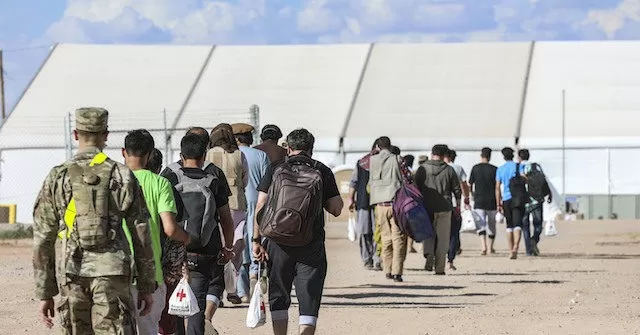The United States has long been a beacon of hope and opportunity for those seeking a better life. However, recent actions taken by the Trump administration have raised concerns about the treatment of migrants and refugees seeking refuge in the country. In a controversial move, the administration has announced plans to award $1.26 billion to build the largest migrant detention center in the nation at Fort Bliss. This decision has been met with both support and criticism, but one thing is clear – the U.S. is taking a firm stance on its immigration policies.
The decision to build the detention center at Fort Bliss comes at a time when the U.S. is facing a surge in migrant arrivals at the southern border. In 2019, over 850,000 migrants were apprehended at the border, a significant increase from previous years. With limited resources and facilities, the U.S. government has struggled to keep up with the influx of migrants, leading to overcrowding and unsanitary conditions in existing detention centers.
The construction of this new facility is a step towards addressing these issues and providing better care for migrants. The $1.26 billion investment will allow for the creation of a state-of-the-art facility that can accommodate up to 10,000 migrants at a time. This will not only help to alleviate the overcrowding in existing centers but also ensure that migrants are provided with proper care and basic necessities.
Critics of the decision have argued that the U.S. should focus on finding more humane solutions to the immigration issue, such as providing alternatives to detention or improving the asylum process. While these are valid concerns, the reality is that the U.S. simply does not have the resources to handle the current number of migrants without detention facilities. The Fort Bliss center will not only provide a safe and secure place for migrants to stay while their immigration cases are being processed but also serve as a deterrent for those who may attempt to cross the border illegally.
Furthermore, the construction of this facility will also have a positive impact on the local economy. With the creation of new jobs and opportunities, the Fort Bliss center will bring economic benefits to the surrounding communities. This will not only stimulate growth but also provide a boost to the local businesses and improve the quality of life for residents.
Additionally, the Fort Bliss center will also have a significant impact on national security. With proper facilities in place, the U.S. will be better equipped to screen and identify potential security threats among the migrants. This will ensure that those who do pose a threat to the country are identified and dealt with accordingly, while still providing a safe haven for those in genuine need.
In light of recent events, the Trump administration’s decision to invest in the Fort Bliss detention center is a bold and necessary step towards addressing the challenges at the southern border. It sends a clear message that the U.S. is taking a firm stance on its immigration policies while also providing a safe and secure environment for migrants. The new facility will not only help to alleviate the strain on existing detention centers but also bring economic benefits and contribute to national security.
It is important to note that the Fort Bliss center is not a permanent solution to the immigration issue. The U.S. must continue to work towards finding more humane and long-term solutions. This includes addressing the root causes of migration and working with other countries to improve their economic and political situations. However, for now, the construction of this detention center serves as a necessary measure to manage the current situation at the southern border.
In conclusion, the Trump administration’s decision to award $1.26 billion for the construction of the largest migrant detention center at Fort Bliss is a positive step towards addressing the challenges at the southern border. This new facility will not only provide a safe and secure environment for migrants but also bring economic benefits and contribute to national security. While it may be met with criticism, it is important to recognize the necessity of such a facility in managing the current immigration situation. The U.S. remains a nation of immigrants, and this decision does not change that. It simply highlights the need for an effective and humane approach to managing immigration.

